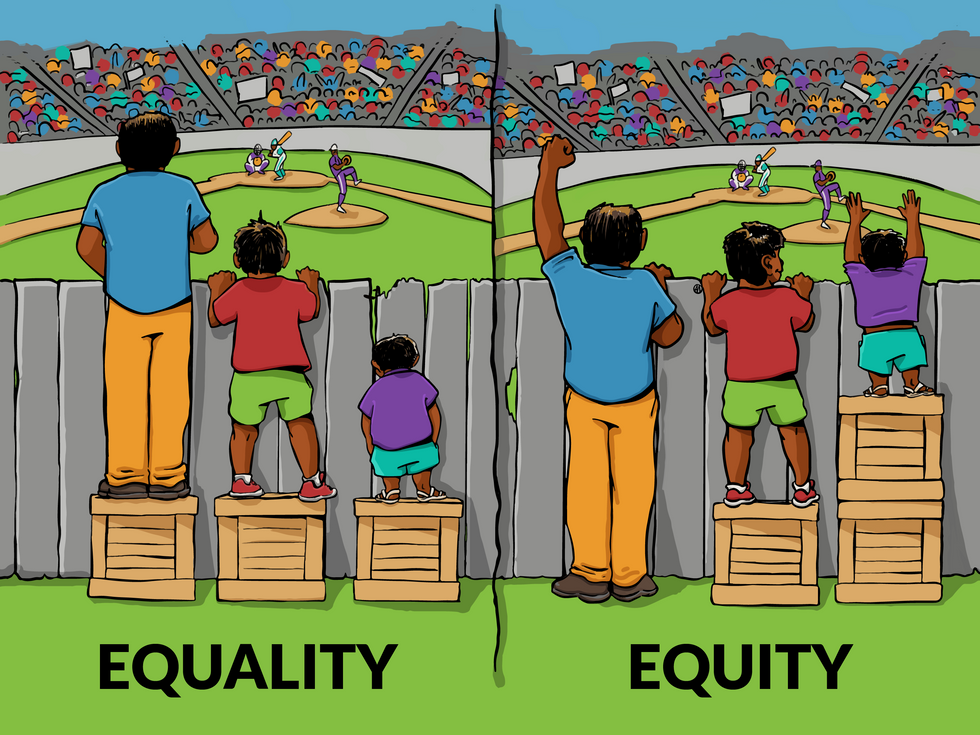As a human rights activist, I began to realize that the U.S. is based on systemic racism
Although my husband and I both came from a middle-class background, we benefited from the way the capitalist system works.

This year has brought so much suffering for many people - both in terms of health and personal finances. However, the portion of the population living off retirement income and/or is invested in the stock market is seeing their financial situation improved. It seems very strange and unfair.
Even though I lived in the U.S. for almost four decades, I have never really thought about systemic racism until this year, when it became a hot topic. I came here from Finland, a Nordic welfare state, which for the most part works in an egalitarian fashion, regardless of race, and historically there were very few people of color in the country.
I was aware of biases and discrimination against our own indigenous communities (Sami) and the Roma. But Blacks were almost nonexistent at the time in my country. In addition, as a human rights activist since my days as a student, I always considered that racism wasn't relevant to me personally.
When I arrived in the U.S. as a white, professionally educated immigrant, married to a U.S. citizen, I was immediately in a more privileged position than most other immigrants. I realized this very quickly. What didn't dawn on me until much later, is how just by setting foot in the U.S., now I became part of "white privilege" and a beneficiary of systemic racism. Although my husband and I both came from a middle-class background, we benefited from the way the capitalist system works.
Many white people in the U.S., will recognize this pattern. Your ancestors came here from Europe centuries ago, and were given a piece of land - taken from the indigenous - to cultivate. In the south, their slaves worked the land and the owners prospered.
READ: An open letter to the U.S. Capitol rioters

When I heard Mr. Trump say on TV to his followers, "I love you," "you are special," I thought that might have been why you and so many others like you support him.
The whites educated their children. The slaves were not allowed to. The "40 acres and a mule" decree after emancipation was quickly reversed. In the north, farmers also cultivated their land, and as they became wealthier, some sold the land and invested in emerging manufacturing. Some were able to extract resources from the land they owned, such as oil. Freed slaves and new immigrants worked in the factories for a pittance and lived hand to mouth.
They never had enough to put any money aside.
All over the world, and throughout history, the question of land ownership has been at the heart of systems of oppression and the revolutions that follow; and its resolution has led to the narrowing of class differences and more societal stability. In the U.S., it seems to me this is still unresolved.
Wealth was passed down to the next generation, and more whites than Blacks had an increasingly better starting point in life when it came to education and a nest egg for building a family. Of course, many people of different backgrounds have been successful (the American Dream), including some of those of slave ancestry or those arriving on these shores dirt-poor from any part of the world.
They achieved wealth through innate ability (think successful Black musicians and athletes) and/or hard work, often selling goods and services to the wealthy whites, especially if they started their own businesses. But their starting point is later and their numbers smaller so that the wealth disparities continue to increase as the stock market yields its returns.
Today, according to the Social Security Administration, 93% of whites have financial assets apart from housing, compared to 62% of Blacks and 54% of Hispanics. The same pattern is seen in all categories of wealth (housing, non-housing equity, tangible assets, pensions and social security), and the dollar amounts are also less in the latter groups. You may have heard the humorous twist on the old saying "he made his money the old fashioned way….he inherited it". So true.
So while so many whites are born with a "silver spoon in their mouth", Black and Brown children start out already disadvantaged and have a more difficult time catching up. I also finally understood the difference between the words "equality" and "equity" by this great cartoon.

Now I also understand what is meant by "reparations". If you're like me, you don't feel guilty about the plight of Black and Brown populations because you personally are "not racist and treat everybody with equal respect". But because the system—going back to the colonization of America—is racist, you have benefited financially, and are continuing to. Therefore, justice demands that you begin to pay back. Many others have said this better. Check out this great infographic and explanation here.
How can this be done? Here are a few ways:
- Most effectively through societal wealth distribution through taxation. Yes, taxation is the hallmark of civilized society – when applied progressively and the proceeds distributed fairly.
- Through free education. This has been the way for minorities as well as poor whites to advance, but quality education still requires wealth. By financing public schools through local taxes, the cycle repeats itself – wealthy districts have better schools. A more equitable way of financing education from pre-K up through college needs to be found.
- As so much wealth is in private hands, wealthy individuals can – in addition to charitable donations to organizations supporting BIPOC people - accomplish a lot by favoring investments in BIPOC owned businesses. Add to that women-owned and ESG companies, and you will set us all on a path to a better future.
- By electing leaders who understand all of the above, we can begin to level the playing field for all citizens, although easier said than done. Today we suffer from an unprecedented amount of media disinformation circulating to people who are in no position to evaluate it critically, due to lack of education. For a young person to become a teacher, journalist or run for office is probably the most laudable career I can think of.


